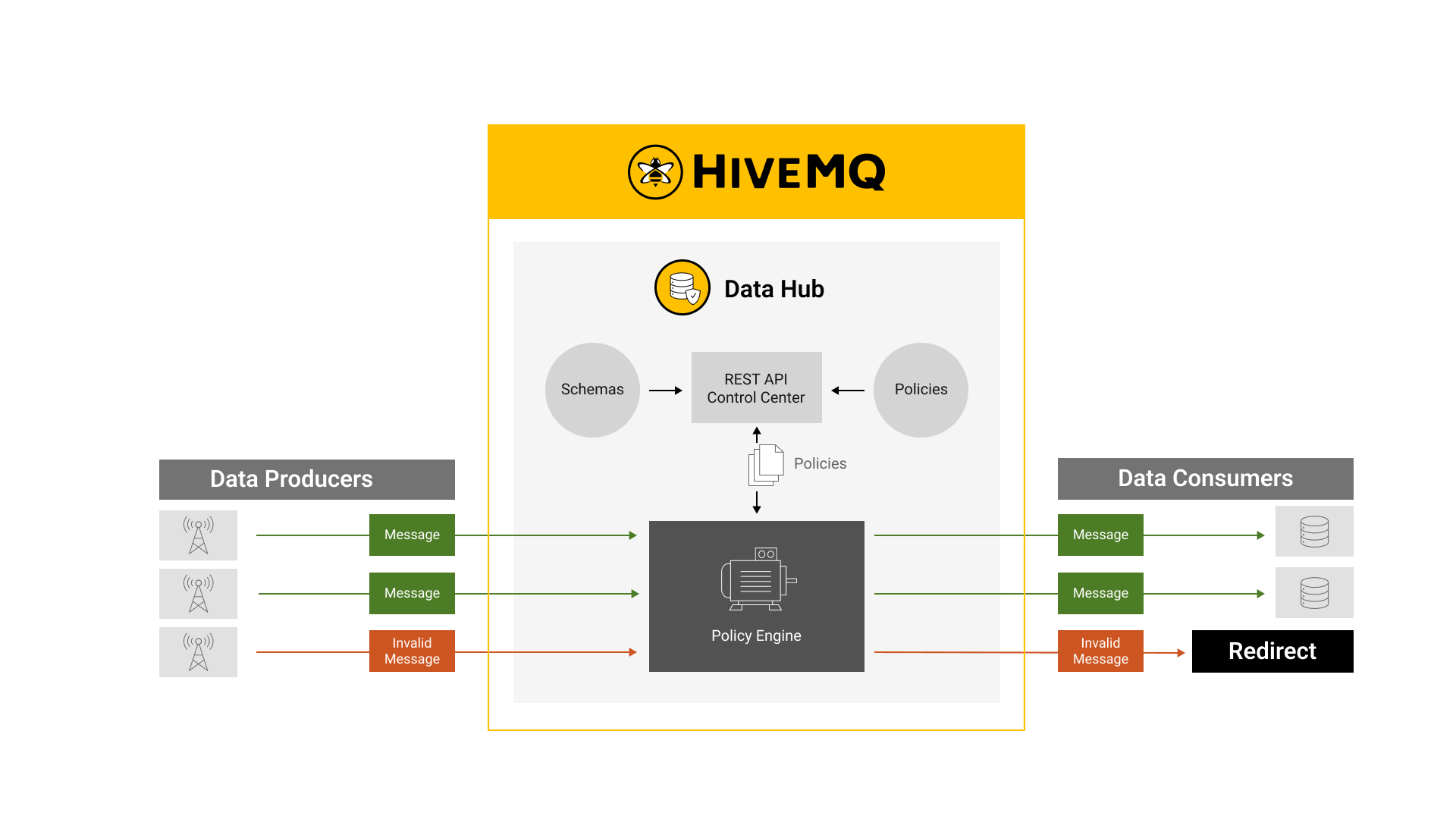HiveMQ Data Hub
HiveMQ Data Hub provides mechanisms to define how MQTT data and MQTT client behavior are handled in the HiveMQ broker.
-
Data Validation allows you to implement declarative policies that check whether your data sources are sending data in the data format you expect.
This process ensures that the value of the data is assessed at an early stage in the data supply chain.
To eliminate the need for subscribing clients to perform resource-intensive validation, checks occur before your data reaches downstream devices or upstream services. -
Behavior Validation gives you the ability to model the behavior of your MQTT clients throughout the entire lifecycle of the client.
This added capability offers a complete overview of client behavior at every state and enhanced control over how clients work with your MQTT broker.
HiveMQ Data Hub behavior policies instantiate behavior models that can be acted upon as needed to meet your business needs.
Currently, HiveMQ Data Hub includes three predefined behavior models that you can use in your behavior policies. For more information, see Behavior Models.
|
The HiveMQ Platform bundle includes a free version of HiveMQ Data Hub with basic functionality. Additionally, you can start a five-hour trial mode to try out the full range of Data Hub capabilities. To learn more about the different ways you can explore HiveMQ Data Hub, see HiveMQ Data Hub Licensing. |
Features of HiveMQ Data Hub
-
Validate MQTT messages with JSON Schema or Protobuf.
-
Enforce policies across the entire MQTT topic tree structure.
-
Reroute valid and invalid MQTT messages to different topics based on the data validation results.
-
Increase the observability of client performance through additional metrics and log statements.
-
Determine the overall quality of your data pipelines
-
Disconnect clients that exhibit unwanted behavior
-
Block a subset of traffic in your incoming data for inspection and debugging
Our validation functionality lets your development teams use the HiveMQ broker to automatically enforce data validation and behavior validation strategies of their own design (including fine-tuned control over how the broker handles incoming valid and invalid MQTT messages).

In this user journey, an engineering team develops a microservice that consumes sensor data on specific MQTT topics. To ensure the reliability of the microservice, the engineers upload a JSON Schema to the HiveMQ Data Hub that outlines the data structure they want to receive.
{
"$id": "https://example.com/geographical-location.schema.json",
"$schema": "https://json-schema.org/draft/2020-12/schema",
"title": "Longitude and Latitude Values",
"description": "A geographical coordinate.",
"required": [
"latitude",
"longitude"
],
"type": "object",
"properties": {
"latitude": {
"type": "number",
"minimum": -90,
"maximum": 90
},
"longitude": {
"type": "number",
"minimum": -180,
"maximum": 180
}
}
}To enforce the rules and structure that the schema outlines, the operations team registers an appropriate policy that tells HiveMQ how to handle incoming MQTT messages.
{
"id": "com.hivemq.policy.coordinates",
"matching": {
"topicFilter": "coordinates"
},
"validation": {
"validators": [
{
"type": "schema",
"arguments": {
"strategy": "ALL_OF",
"schemas": [
{
"schemaId": "gps_coordinates",
"version": "latest"
}
]
}
}
]
},
"onFailure": {
"pipeline": [
{
"id": "logFailure",
"functionId": "log",
"arguments": {
"level": "WARN",
"message": "${clientId} sent invalid coordinates on topic '${topic}' with result '${validationResult}'"
}
}
]
}
}In the example, the policy ensures that the HiveMQ broker drops MQTT messages published to the MQTT topic coordinates that do not match the desired gps_coordinates schema.
In addition, HiveMQ prints a log statement to help debug the misbehaving clients.
The result is a more efficient microservice that only processes MQTT messaging data that adheres to the specified format. This type of well-defined data validation can save time and resources:
-
Enables parallel development
-
Reduces the number of issues that reach production systems
-
Simplifies the identification of invalid data sources
HiveMQ Data Hub Licensing
The HiveMQ Data Hub offers various license tiers to cater to different needs.
For detailed information or to discuss which option is the best for your individual use case, contact our sales team.
Since HiveMQ 4.17, a free version of the HiveMQ Data Hub is included in the HiveMQ Platform bundle.
Free mode enables you to create a single policy and use a limited set of functionality.
| To explore the complete capabilities of the HiveMQ Data Hub, you can activate a 5-hour trial mode at no additional cost. For more information, see Activate HiveMQ Data Hub Trial Mode. |
Activate Data Hub Trial Mode
The 5-hour Data Hub trial mode lets you explore the complete capabilities of HiveMQ Data Hub at no additional cost.
In trial mode, you can try all available Data Hub features and create an unlimited number of schemas and policies.
After your trial ends, you can keep using the capabilities offered in Free mode or upgrade with a license that fits your needs.
For more information, contact our sales team.
Before you activate your trial mode, make sure the <enabled> tags for the <data-hub> and the <rest-api> are set to true in the config.xml file of your HiveMQ instance.
For more information, see Configuration.
|
-
Send a POST-request with an empty body to the endpoint:
<host>:<port>/api/v1/management/data-hub/start-trial
with the default values for the REST API listener:
localhost:8888/api/v1/management/data-hub/start-trial -
The status code
204is returned upon successful activation.
The trial mode gives you full access to all HiveMQ Data Hub functionality for a duration of 5 hours.
When your trial period ends, Data Hub reverts to the Free mode or the installed license, depending on your configuration.
| Existing policies that exceed the limitations of the mode you return to after your trial remain in place. However, it is not possible to add new policies that exceed the limits of the mode that is currently active. |
| The Data Hub trial mode is not available in HiveMQ Edge. |
Get Started
The best way to set up and learn more about HiveMQ Data Hub is to follow our Quick Start Guide.